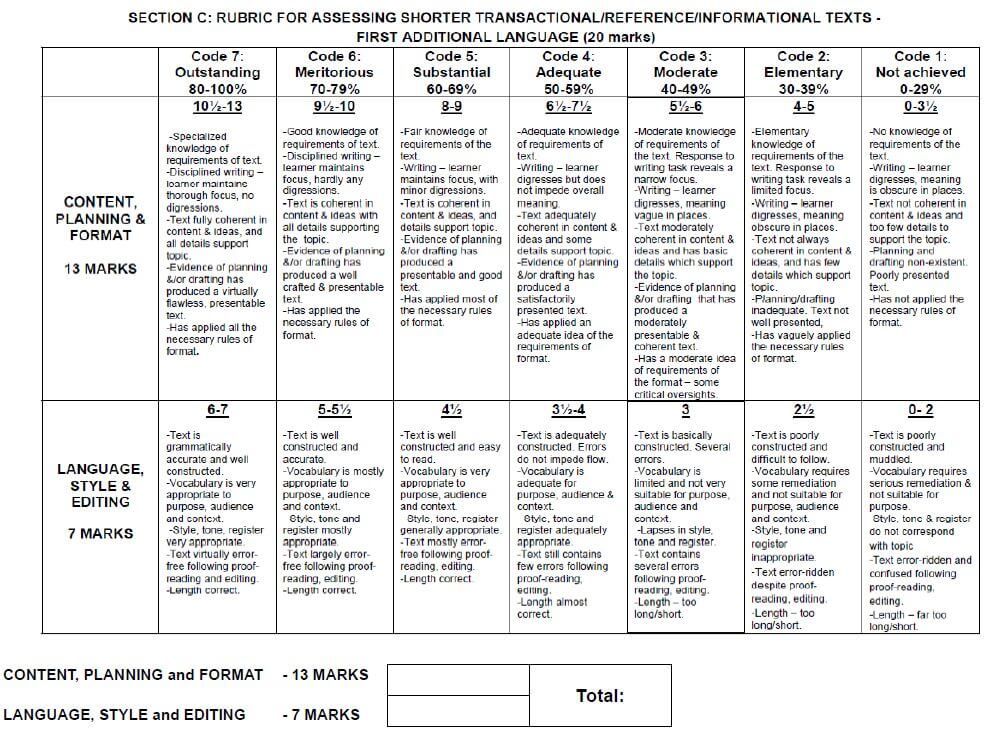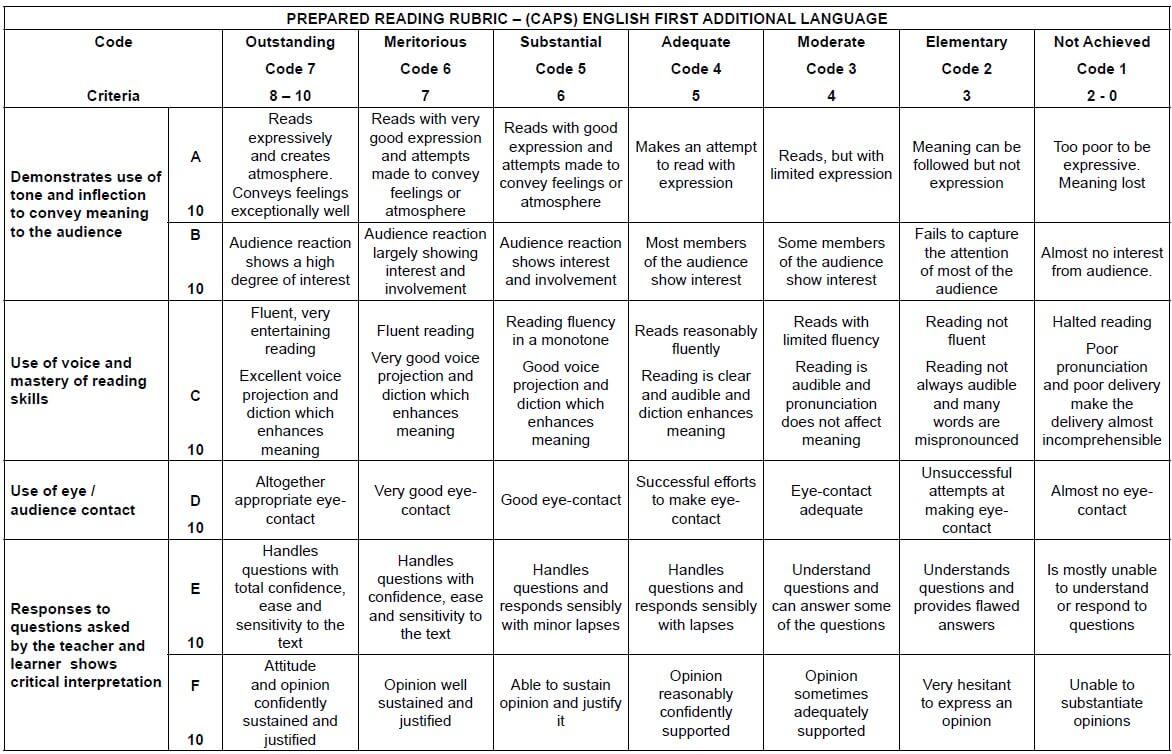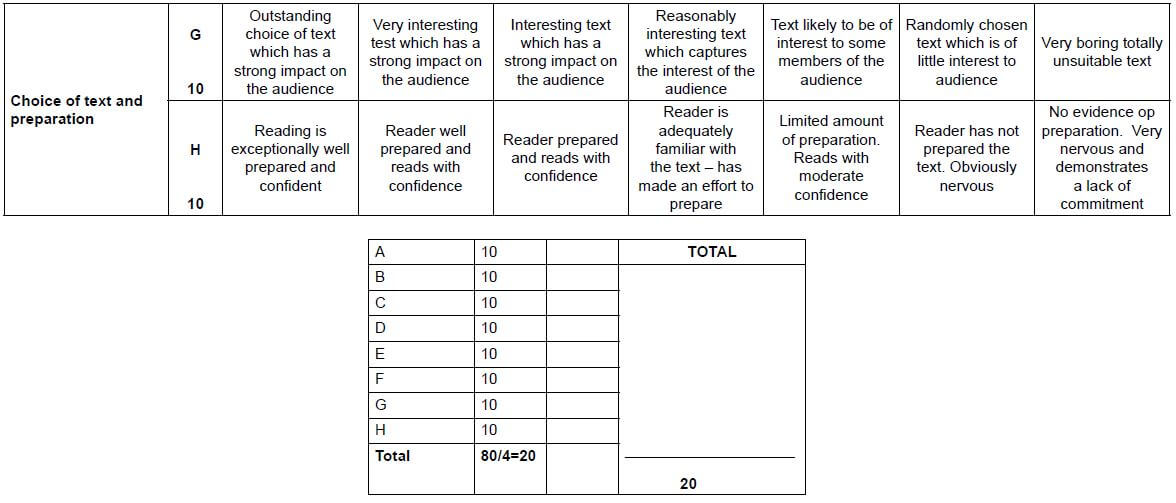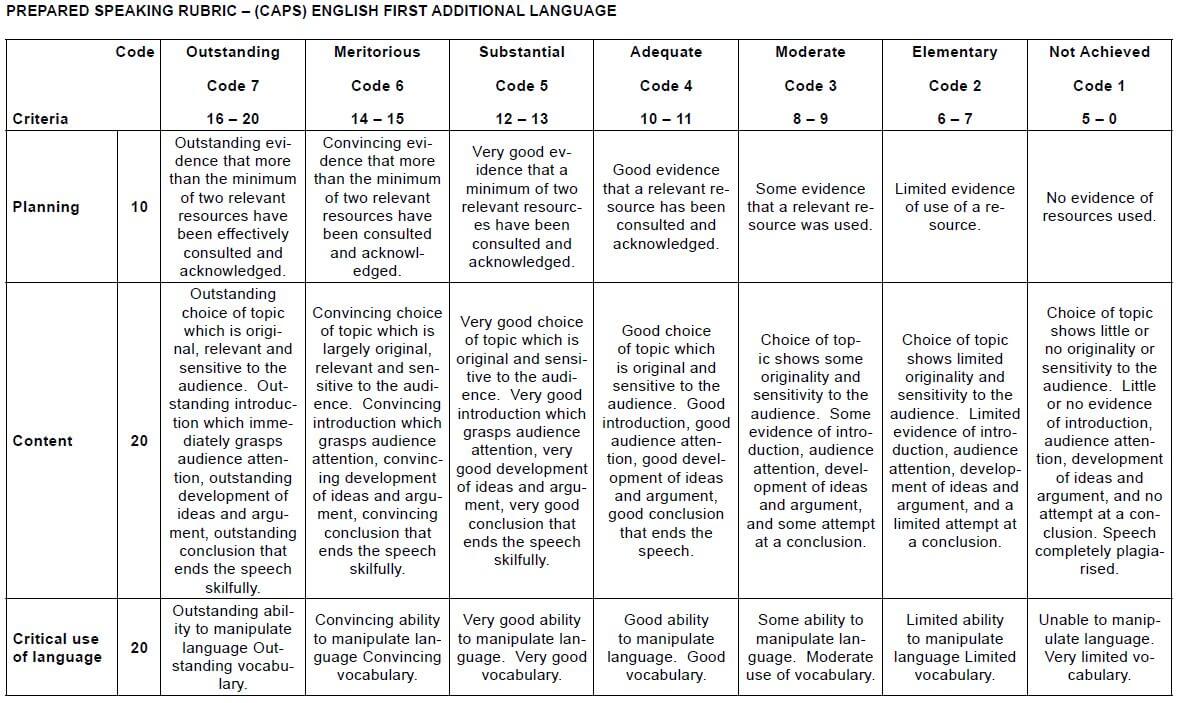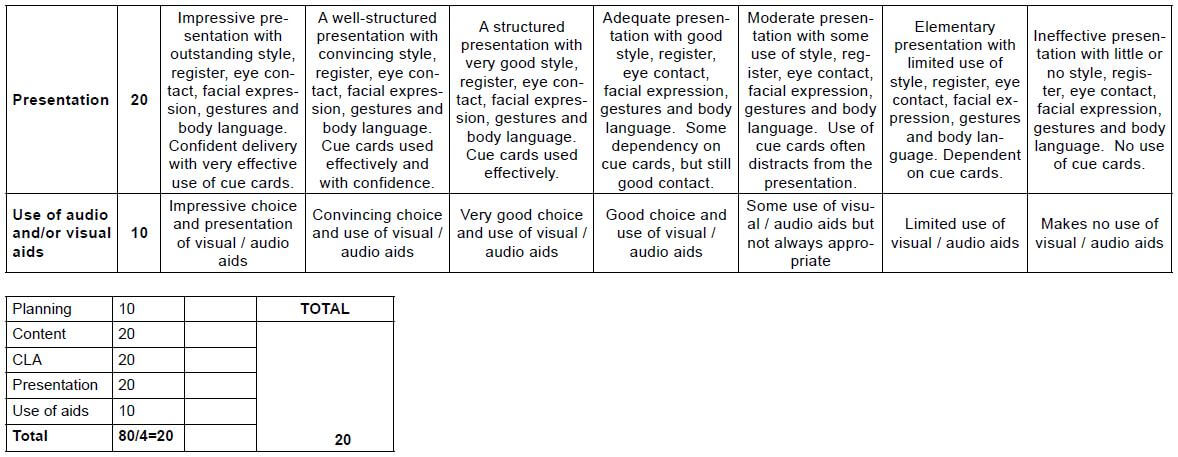ENGLISH FIRST ADDITIONAL LANGUAGE SCHOOL BASED ASSESSMENT EXEMPLARS - CAPS GRADE 12 LEARNER'S GUIDE
Share via Whatsapp Join our WhatsApp Group Join our Telegram GroupENGLISH FIRST ADDITIONAL LANGUAGE
SCHOOL BASED ASSESSMENT EXEMPLARS - CAPS
GRADE 12
LEARNER'S GUIDE
| TABLE OF CONTENT | |||
| CONTENT | PAGE | ||
| 1 | Introduction | 3 | |
| 2 | Aims and objectives of school-based assessment | 4 | |
| 3 | Programme of assessment | 5 | |
| 4 | Assessment tasks | 6 | |
| a | Term 1 | ||
| Task 1 | 6 | ||
| Task 2 – Exemplar 1 | 8 | ||
| Task 2 – Exemplar 2 | 10 | ||
| Task 2 – Exemplar 3 | 12 | ||
| Task 3 – Exemplar 1 | 14 | ||
| Task 3 – Exemplar 2 | 16 | ||
| Task 3 – Exemplar 3 | 17 | ||
| b | Term 2 | ||
| Task 5 | 19 | ||
| Sample: Reading passages | 20 | ||
| Task 6 | 23 | ||
| c | Term 3 | ||
| Task 9 – Exemplar 1 | 25 | ||
| Task 9 – Exemplar 2 | 27 | ||
| 5 | Rubrics | 33 | |
| Essay | 33 | ||
| Longer Transactional Task | 34 | ||
| Shorter Transactional Task | 35 | ||
| Prepared Reading | 36 | ||
| Prepared Speech | 38 | ||
1. Introduction
School-based assessment in English First Additional Language is an integral part of your preparation for the final examinations. Your school-based assessment mark is formally recorded by your teacher for progression and certification purposes. It is important that you understand that school-based assessment does impact on your final marks at the end of Grade 12.
These formal assessment tasks provide your teacher with a systematic way of evaluating how well you are progressing and it includes various assessment tasks such as tests, examinations, writing tasks, oral presentations and listening comprehension.
School-based assessment is compulsory for all students. If you do not comply with the requirements specified according to the policy, you may not be eligible to enter for the subject in the final examination.
Formal assessment tasks form part of a year-long formal programme of assessment. These tasks should not be taken lightly and you should submit your best possible efforts for final assessment.
2. Aims and objectives of school-based assessment
Assessment, primarily, is aimed at improving your learning and achievement. Through assessment you get information about what you should learn.
Assessment provides complete information about your achievement. It provides information on how much you know and what you can do with what you know. Furthermore, assessment is used to evaluate your knowledge and skills, as well as your values, attitudes and habits that have an influence on your performance and achievements at school and out of it.
Assessment complements the teaching process. There is a clear relationship between the goals and the content of instruction and those of assessment (between what is learnt and taught and what is assessed).
You have an active role to play in the assessment process, thus enhancing your progress. The different methods and types of assessment, which take into consideration various learning styles and personality types, ensure that your potential to do well is laid out for you.
Assessment is a continuous process. It involves activities of monitoring and evaluation of your performance and achievements during the entire school year.
You should be familiar with what you are expected to learn, how and when you are going to be assessed.
3. Programme of assessment
Term 1 | Task 1 | Task 2 | Task 3 | Task 4 | ||
Oral: | Writing: | *Writing: | **Test 1: | |||
Total: | 10 | 50 | 30 | 40 | ||
Term 2 | Task 5 | Task 6 | Task 7 | Task 8 | ||
Oral: | Oral: | Literature: | ****Mid-year examinations | |||
Total: | 20 | 20 | 35 | 250 | ||
Term 3 | Task 9 | Task 10 | ||||
***Writing: Shorter transactional writing | ****Preparatory examinations | |||||
Total: | 20 | 250 | ||||
* Friendly/Formal letters (request/complaint/application/business)/formal and informal letters to the press/ curriculum vitae and covering letter/obituary/agenda and minutes of meeting/report/review/newspaper article/magazine article/dialogue/ interview.
** Test 1 should be set out of 40 marks or, if more, should be converted to 40 marks. While the Comprehension, Summary, Language structures and conventions combination is suggested, teachers are urged to design a combination of aspects that fits the character (test programme, time allocation, etc.) of the school. A test in the Programme of Assessment should not be made up of several smaller tests. Each test should cover a substantial amount of content, should be set for 45–60 minutes, and should reflect the different cognitive levels as set out for exam papers.
*** Advertisements/Diary entries/Postcards/Invitation cards/Filling in forms/ Directions/Instructions/Flyers/Posters/ emails.
**** Mid-year and Trial examinations: In Grade 12 one of the tasks in Term 2 and/or Term 3 (Tasks 8 and/or 10) must be an internal examination. In instances where only one of the two internal examinations is written in Grade 12, the other examination could be replaced by a test. A recommendation has been made that the written test, if this option is chosen, should be set out of 80 marks. This test should take the format of the Language structure and conventions, as set in the examinations.
4. Assessment tasks
This section outlines the various tasks that are expected you. You are also given guidance on how to approach the tasks.
a. Term 1
Task 1 – Oral: Listening comprehension
You will listen to an extract, for the first time, when your teacher reads it to you on the day of the assessment. You will not be given a chance to read the passage on your own. You will have access to the questions once the teacher has read the passage for the first time. It is thus important for you to listen attentively when the teacher reads the passage.
You may want to take note of the information that follows:
Many people think of listening as a skill that requires no thought or effort. The listening comprehension skill is therefore often overlooked in teaching and learning. However, what many people do not realise is that listening is as much a fundamental skill in language learning as speaking, reading and writing.
Better listening helps you to focus on specific vocabulary acquisition, grammar practice and listening for different purposes. You can consciously focus on remembering the vocabulary used in each activity when you listen and understand the purpose of the activity.
How your teacher will administer the formal listening comprehension tasks:
- You should have a blank page.
- The teacher will alert you to the type of information you will be required to listen for and to give a brief background of the passage.
- The passage will, at least, be read twice.
- During the first reading the teacher will read through the text so that you can become familiar with the content. During this reading you should listen attentively and may not write. This will help you to gain an overall understanding of the text.
- During the second reading, the text will be read at normal pace. During this reading, you may make listening notes.
- After the second reading, you will be given the questions and enough time to answer questions in full sentences.
- You are urged to go through your answers to ensure that they are written out correctly, and they make sense, before you submit to the teacher.
Task 2 – Writing: Essay
In order to write well, you need knowledge of different text types, a wide vocabulary, a good control of English grammar, spelling and punctuation, and a critical understanding of the potential effects of your writing.
An essay is an extended piece of writing, in which a writer expresses his/ her point of view on the topic given. An essay should have an introduction, body and conclusion. A brief explanation of each follows:
Introduction
The introduction should catch the reader’s attention, define the topic and briefly tell the reader what the essay will be addressing.
Body
The body comprises the full content of the essay. The body must be divided into paragraphs, each of which must pursue a specific idea to the end. The writer must address all the ideas he or she wanted to address, keeping to the topic.
Conclusion
The conclusion is the ending, the rounding-off of the presentation. This should tie up all that was presented by the writer, a parting shot that justifies the writer’s point of view. As this is the end, the writer must not bring in new information.
Task 2 – Writing: Essay Total out of 50
Exemplar 1
Name: ____________________________ Grade: ______________
Date of submission: ____________________
INSTRUCTIONS
- Write an essay of between 250 and 300 words on any ONE of the following topics.
- Write down the question number correctly and supply a suitable title where required to do so.
- Remember that you have to show all the steps in your writing process.
- Your essay will be assessed according to the attached rubric.
TOPICS
- Can we still trust and look up to our sporting heroes to be the best role models that they can be? Discuss.
- Music is a part of every culture and plays different roles in people’s lives. Write about how the role music plays a role in your culture or in your own life.
- Teens love to talk: they love to talk online, on the air, on the phone, at school, after school, at the mall, in the car, behind their friends’ backs – what on earth do they talk about?
- Write an essay in which the following words appear: Then I realised that a mirror reflects only what is on the outside and not who you are on the inside...
- English should be the only language of teaching and learning in South African schools. Do you agree?
- The day I saw red ...
- Look at the pictures below. Use any ONE of them to write your essay. There should be a clear link between the picture and your essay.
7.1
[Source: Google image]
7.2
[Source: http://www.lifelonghappiness.com]
TOTAL: 50
Task 2 – Writing: Essay
Exemplar 2
Name: ____________________________ Grade: ______________
Date of submission: ____________________
INSTRUCTIONS
- Write an essay of between 250 and 300 words on any ONE of the following topics.
- Write down the question number correctly and supply a suitable title where required to do so.
- Remember that you have to show all the steps in your writing process.
- Your essay will be assessed according to the attached rubric.
TOPICS
- Every love story is beautiful, but this one is my favourite.
- Imagine you are 60 or 70 years old. Give your views about the teenagers of today.
- School does not prepare you for the real world. Discuss.
- Write an essay in which the following words appear: “It was dark and quiet and I had a feeling that all hell was about to break loose …”
- Technology such as computers, cellphones, PlayStations, Xbox and iPads are destroying the future generation of sporting stars. Do you agree?
- Memories of home.
- Look at the pictures below. Use any ONE of them to write your essay. There should be a clear link between the picture and your essay.
7.1
[Source: Google image]
7.2
[Source: Google image]
TOTAL: 50
Task 2 – Writing: Essay
Exemplar 3
Name: ____________________________ Grade: ______________
Date of submission: ____________________
INSTRUCTIONS
- Write an essay of between 250 and 300 words on any ONE of the following topics.
- Write down the question number correctly and supply a suitable title.
- Remember that you have to show all the steps in your writing process.
- Your essay will be assessed according to the attached rubric.
TOPICS
- Mistakes are proof that you are trying.
- If you could have any two famous people as your parents, who would you choose and why?
- “You don’t have to hold a position in order to be a leader.”
~Anthony J D’Angelo
Discuss. - Start your essay with the following words:”The doorbell rings. The door opens and a package is found on the front porch. A voice shouts, We’ve got another one!” Tell the rest of this story.
- Where do you go when you want to get away from the pressures of life, family and school? Write about that place.
- Good teaching in school hours will make homework unnecessary. Do you agree?
- Look at the pictures below. Use any ONE of them to write your essay. There should be a clear link between the picture and your essay.
7.1
[Source: Google image]
7.2
[Source: Google image]
TOTAL: 50
Task 3 – Writing: Transactional Writing
Transactional writing texts are either a response or an initiation of a response. As implied, these are ‘transaction texts’ - a friendly letter of appreciation will possible yield a response, as much as a speech will get the audience won over or yelling in disagreement. Transactional texts are divided into Longer and Shorter texts.
Exemplar 1
Name: ____________________________ Grade: ______________
Date of submission: ____________________
INSTRUCTIONS
- Write a response to any ONE of the following topics.
- The content of your response should be between 120 and 150 words in length.
- Write down the question number and heading of the text you have chosen, for example 1. Friendly Letter.
- Remember that you have to show all the steps in your writing process.
- Pay particular attention to format, language, register and audience.
- Your piece will be assessed according to the attached rubric.
TOPICS
- Friendly Letter
You attended a concert. Write a letter in which you describe your experience to a friend who could not attend the concert. - Interview
You have the opportunity to interview any celebrity of your choice. Write down the interview. - Minutes
Your youth group has decided to raise funds in order to assist a local charity organisation to buy blankets and food for the less-privileged families.
The first meeting took place and you were the secretary of the meeting. The last three matters to be discussed under the agenda point “New Matters” were:- Fund-raising activities
- Selection of charities to receive the blankets and food
- Assigning of duties
Write the part of the minutes that reflects only the discussion on the three points above. Do NOT include details of the rest of the meeting.
- Formal Report
The principal of your school would like to encourage the use of cellphones to improve learning in the classroom. He has requested you, as a member of the Representative Council of Learners (RCL), to investigate this possibility. Write a formal report in which you record your findings and recommendations. - Letter of Formal Request
Write a well-motivated formal letter to the Mayor of your local municipality in which you request that an empty field in your neighbourhood be changed into a playground for local children.
TOTAL: 30
Task 3 – Writing: Transactional Writing
Exemplar 2
Name: ____________________________ Grade: ______________
Date for submission: ____________________
INSTRUCTIONS
- Write a response to any ONE of the following topics.
- The content of your response should be between 120 and 150 words in length.
- Write down the number and heading of the text you have chosen, for example 1. Letter of complaint.
- Remember that you have to show all the steps in your writing process.
- Pay particular attention to format, language, register and audience.
- Your piece will be assessed according to the attached rubric.
TOPICS
- Letter of complaint
While out walking your dog, you fell over the root of a tree that had grown through the pavement. You cut your knees badly and sprained an ankle and a wrist. Write a letter of complaint to a member of the local municipality complaining about the state of the pavements in your neighbourhood. - Dialogue
You arrive home from a party at 03:00, having promised your parents you would be in by 23:30. You overhear a conversation between your parents as you are sneaking in. Write out this conversation in dialogue form. - Newspaper article
Write a newspaper article for ONE of the following headlines:- Student caught red-handed
- Illegal connection kills boy
- Facebook causes breakup
- Informal Report
You were an eyewitness to an act of vandalism in your community.
Your parents have asked you to write an informal report to a community leader in which you report what you have witnessed. - Speech
Write a speech in which you encourage learners in your school to become involved in school projects. Entitle your speech:
“If not you, then who?”
TOTAL: 30
Task 3 – Writing: Transactional Writing
Exemplar 3
Name: ____________________________ Grade: ______________
Date for submission: ____________________
INSTRUCTIONS
- Write a response to any ONE of the following topics.
- The content of your response should be between 120 and 150 words in length.
- Write down the number and heading of the text you have chosen, for example 1. Letter of complaint.
- Remember that you have to show all the steps in your writing process.
- Pay particular attention to format, language, register and audience.
- Your piece will be assessed according to the attached rubric.
TOPICS
- Letter to the press
Read the following letter that appeared in your local newspaper. Write a letter to the editor in which you express your views about the cited practice. You may agree or disagree with the viewpoints expressed in the letter.I am writing this letter about dogs being seen in all stores in shopping carts. I understand there are service animals (for blind people) but now people take their animals wherever they please. I put my food items in these carts as well as my 1-year-old granddaughter. I was at my eye doctor yesterday and they had a sign on the door that said NO PETS PLEASE. These signs should be placed in all stores. Mind you, I love animals myself but it is now being blown out of proportion.
From: Animals-at-home
- Magazine article
Write an article that will appear in a teen magazine. Use ONE of the following topics:- Cheating at school
- Resolving teacher-learner conflict
- How to deal with disappointing marks
Provide a suitable title for the article.
- Review
Your favourite artist has released a new CD. You have been asked to review this CD for your school newspaper. Write the review. - Letter of thanks
You lost your wallet with your ID book and some cash in it. Two weeks later your received a package in the mail. Someone had found your wallet and posted it back to you. When you opened the wallet all your belongings were still there.
Write a letter of thanks to the person who picked up your wallet and returned it.
TOTAL: 30
b. Term 2
Task 5 – Oral: Prepared Reading
Date of presentation: ____________________________________
Prepare a reading piece for oral assessment. Your reading should be TWO to THREE minutes long. Carefully follow the instructions:
- Take some time to select a suitable passage that you enjoy reading.
- Read it silently to yourself to familiarise yourself with its contents.
- Then read it aloud several times. When you feel that you have mastered it, read it in front of the mirror, looking at yourself several times during the reading. If you can do this, it means that you will look up at your audience several times during the reading.
- You might also like to read to a willing audience for practice.
- You will need to project your voice and read with good pace.
- Maintain good posture and eye contact as you read.
- Practise pronouncing all the words correctly.
- Remember that you will be required to answer questions about the passage you have read.
TOTAL: 10
Sample: Reading passages
SAMPLE PASSAGE 1
As I had expected, it turned out to be quite a business. I had to notify the police as well as the health authorities, and answer a lot of tedious questions: How was it I was ignorant of the boy’s presence? If I did not supervise my native quarters, how did I know that that sort of thing didn’t go on all the time? Et cetera, et cetera. And when I flared up and told them that so long as my natives did their work, I didn’t think it my right or concern to poke my nose into their private lives, I got from the coarse, dull-witted police sergeant one of those looks that come not from any thinking process going on in the brain but from that faculty common to all who are possessed by the master-race theory – a look of insanely inane certainty. He grinned at me with a mixture of scorn and delight at my stupidity.
Then I had to explain to Petrus why the health authorities had to take away the body for a post-mortem – and, in fact, what a post-mortem was. When I telephoned the health department some days later to find out the result, I was told that the cause of death was, as we had thought, pneumonia, and that the body had been suitably disposed of. I went out to where Petrus was mixing a mash for the fowls and told him that it was all right, there would be no trouble; his brother had died from that pain in his chest. Petrus put down the paraffin tin and said, ‘When can we go fetch him, baas?’
‘To fetch him?’
‘Will the baas please ask them when we must come?’
I went back inside and called Lerice, all over the house. She came down the stairs from the spare bedrooms, and I said, ‘Now what am I going to do? When I told Petrus, he just asked calmly when they could go and fetch the body. They think they’re going to bury him themselves.’
‘Well, go back and tell him,’ said Lerice. ‘You must tell him. Why didn’t you tell him then?’
When I found Petrus again, he looked up politely. ‘Look, Petrus,’ I said. ‘You can’t go to fetch your brother. They’ve done it already – they’ve buried him, you understand?’
‘Where?’ he said, slowly, dully, as if he thought that perhaps he was getting this wrong.
‘You see, he was a stranger. They knew he wasn’t from here, and they didn’t know he had some of his people here, so they thought they must bury him.’ It was difficult to make a pauper’s grave sound like a privilege.
‘Please, baas, the baas must ask them.’ But he did not mean that he wanted to know the burial-place. He simply ignored the incomprehensible machinery I told him had set to work on his dead brother; he wanted the brother back.
‘But, Petrus,’ I said, ‘how can I? Your brother is buried already. I can’t ask them now.’
‘Oh baas!’ he said. He stood with his bran-smeared hands uncurled at his sides, one corner of his mouth twitching. ‘Goodness, Petrus, they won’t listen to me! They can’t, anyway. I’m sorry, but I can’t do it. You understand?’
He just kept on looking at me, out of his knowledge that white men have everything, can do anything; if they don’t, it is because they won’t.
And then, at dinner, Lerice started. ‘You could at least phone,’ she said.
‘What do you think I am? Am I supposed to bring the dead back to life?’
[Source: Six Feet of the Country, Nadine Gordimer]
SAMPLE PASSAGE 2
“Dave, I know Port St Johns is out of your district, but I’m asking you a favour. That’s what ex-colleagues are for. No, seriously, we haven’t heard from her for two months.”
“I remember Teresa. Wasn’t she a rather wild matric student with a ponytail?”
“She’s grown up since then, Dave. Believe me. She now answers to the name of Tigger. You wouldn’t recognise her.” “Tigger, uh. As in Winnie the Pooh? What did you say she was doing at the Wild Coast?”
“Studying,” Jake answered quickly.
“Well, you’ll have to send me a photograph.”
“I’ll fax you one,” replied Jake. “Don’t you have somebody in the Port St Johns area who could ask a few questions?” “It’s the Wild West up there, Jake, with a lot of ground to cover, but I’ll see what we can do.” “Thanks, Dave, I really appreciate it. When next you’re in Cape Town…”
“I know, I know, you’ll wine and dine me. Promises, promises.”
Embarrassed by having made a request which was completely out of the normal channels of his profession, Jake changed the subject and asked some questions about the cases Dave was working on in East London. It didn’t take long for them to run out of things to say to each other. An old friend living a new life in a different city is hard to keep in touch with, and Jake was relieved when the conversation petered out and he could say goodbye
Jake checked his watch. Sixteen minutes past seven – morning parade had already begun. He hurried downstairs and slid into a vacant seat by the door, nodded apologies to the Colonel and pulled out his notebook. Except for the taxi ambush in Mowbray it had been a quiet night on the Peninsula. BJ reported on the possibility of one of the township gangs attacking an armoured vehicle. He had been warned by an informer, who had chosen to turn in his friends and claim the advertised ten thousand rand reward rather than risk being involved in a bungled attempt to rob a bank security vehicle. BJ was working on it and would keep everyone informed about the progress of the negotiations. Jackson Sondile’s absence had been noted with displeasure by the Colonel, but Jake covered for his colleague, informing the meeting that his partner was working on something related to the Witbooi case. BJ immediately objected angrily to Sondile going solo on something which was now his affair. The Colonel made no comment, merely moving business along. By a quarter
to eight the meeting was over and the men drifted off upstairs for morning sandwiches and coffee. Dan caught Jake’s eye and summoned Jake into his office.
“I got an ugly call from Captain Steenkamp early this morning. Apparently you and Sondile were sniffing around on his crime scene.” The Colonel moved in behind his desk and sat down, tilting his chair back until his head touched the wall behind him.
“We were responding to an all-units. When we got there we found it was a Valentine taxi which had been attacked. It didn’t take much brainpower to make the connection between the ambush and the kid who was murdered the other night. The owner of the taxi, a Mr Ronnie Valentine, had identified the murdered boy as his son. I also spoke to his mother yesterday morning,” said Jake, unsure whether he should sit down or remain standing. Dan Pienaar observed him silently for a moment. With the Colonel you were never sure when it was acceptable to behave informally. Jake remained standing.
“Ja, well, I don’t know how you do it, Jake, but it looks like this case of yours is getting to be bigger than I first expected. Steenkamp is up to his neck in taxi violence. It’s escalating all the time. It seems there’s a full-out war developing between Tetwa Taxis and this Ronnie Valentine character. Late last night there were more shots exchanged in Guguletu. Steenkamp believes it was in retaliation for the Mowbray ambush. No one was killed, but a Tetwa taxi was damaged. Steenkamp is scratching around, but with nothing to show for it, and I think the key to the matter lies with this kid, Jimmy Valentine.” Dan Pienaar swung his chair forward and opened one of the desk drawers. He handed a piece of paper to Jake, who leant over the empty chair on his side of the desk to take it.
[Source: Who Killed Jimmy Valentine?, Michael Williams]
SAMPLE PASSAGE 3
Congratulations. The fact you’re reading this means you’ve taken one giant step closer to surviving till your next birthday. Yes, you, standing there, leafing through these pages. Do not put this book down. I’m dead serious – your life could depend on it.
This is my story, the story of my family, but it could just as easily be your story too. We’re all in this together, trust me on that.
I’ve never done anything like this, so I’m just going to jump in, and you try to keep up.
Okay. I’m Max, I’m fourteen. I live with my family, who are five kids not related to me by blood, but still totally my family. We’re – well, we’re kind of amazing. Not to sound too full of myself, but we’re like nothing you’ve ever seen before.
Basically, we’re pretty cool, nice, smart - but not ‘average’ in any way. The six of us – me, Fang, Iggy, Nudge, the Gasman, and Angel – were made on purpose, by the sickest, most horrible ‘scientists’ you could possibly imagine. They created us as an experiment. An experiment where we ended up only 98% human. That other 2% has had a big impact, let me tell you.
We grew up in a science-lab-slash-prison called the School, in cages, like lab rats. It’s pretty amazing we can think or speak at all. But we can – and so much more.
There was one other School experiment that made it past infancy. Part human, part wolf – all predator: they’re called Erasers. They’re tough, smart, and hard to control. They look human, but when they want to, they are capable of morphing into wolf men, complete with fur, fangs, and claws. The School uses them as guards, police - and executioners.
To them, we’re six moving targets – prey smart enough to be a fun challenge. Basically, they want to rip our throats out. And make sure the world never finds out about us.
But I’m not lying down just yet. I’m telling you, right?
This story could be about you – or your children. If not today, then soon. So please, please, take this seriously. I’m risking everything that matters by telling you – but you need to know.
Keep reading – don’t let anyone stop you.
– Max. And my family: Fang, Iggy, Nudge, the Gasman, and Angel.
Welcome to our nightmare.
[Source: The Prologue – Maximum Ride The Angel Experiment, James Patterson]
SAMPLE PASSAGE 4
‘It is clear that it is the work of a madman.’ Jon de Jong, tall, lean, grey, ascetic and the general manager of Schiphol airport, looked and sounded very gloomy indeed and, in the circumstances, he had every justification in looking and sounding that way.
‘Insanity. A man has to be deranged, unhinged, to perform a wanton, mindless, pointless and purposeless task like this.’ Like the monkish professor he so closely resembled, De Jong tended to be precise to the point of pedantry and, as now, had a weakness for pompous tautology.
‘A lunatic.’
‘One sees your point of view,’ De Graaf said. Colonel van de Graaf, a remarkably broad man of medium height with a deeply trenched, tanned face, had about him an imperturbability and an unmistakable cast of authority that accorded well with the Chief of Police of a nation’s capital city. ‘I can understand and agree with it but only to a certain extent. I appreciate how you feel, my friend. Your beloved airport, one of the best in Europe -’
‘Amsterdam airport is the best in Europe.’ De Jong spoke as if by rote, his thoughts elsewhere. ‘Was.’
‘And will be again. The criminal responsible for this is, it is certain, not a man of a normal cast of mind. But that does not mean that he is instantly certifiable. Maybe he doesn’t like you, has a grudge against you. Maybe he’s an ex-employee fired by one of your departmental managers for what the manager regarded as a perfectly valid reason but a reason with which the disgruntled employee didn’t agree. Maybe he’s a citizen living close by, on the outskirts of Amsterdam, say, or between here and Aalsmeer, who finds the decibel level from the aircraft intolerably high. Maybe he’s a dedicated environmentalist who objects, in what must be a very violent fashion, to jet engines polluting the atmosphere, which they undoubtedly do. Our country, as you are well aware, has more than its fair share of dedicated environmentalists. Maybe he doesn’t like our Government’s policies.’ De Graaf ran a hand through his thick, iron-grey hair. ‘Maybe anything. But he could be as sane as either of us.
‘Maybe you’d better have another look, Colonel,’ De Jong said. His hands were clenching and unclenching and he was shivering violently. Both of those were involuntary but for different reasons. The former accurately reflected an intense frustration and anger; the latter was due to the fact that, when an ice-cold wind blows east-north-east off the Ijsselmeer, and before that from Siberia, the roof of the main concourse of Schiphol airport was no place to be. ‘As sane as you or I? Would you or I have been responsible for this – this atrocity? Look, Colonel, just look.
De Graaf looked. Had he been the airport manager, he reflected, it would hardly have been a sight to gladden his heart. Schiphol airport had just disappeared, its place taken by a wave-rippled lake that stretched almost as far as the eyes could see.
[Source: Floodgate, Alistair Maclean]
Task 6 – Oral: Prepared Speech
Date of presentation: _________________________________
INSTRUCTIONS
- Prepare a speech for oral assessment.
- Your oral presentation should be TWO to THREE minutes long.
- Follow the instructions carefully.
- Do thorough research on your chosen topic.
- Collect and keep texts (pictures, posters, cartoons or any other audio-visual material). Display or refer to these when you present your speech.
- Write a speech which, when read at a moderate pace, lasts at least THREE minutes. Read your prepared passage aloud to a friend who will be able to assist you with pronunciation and fluency.
- Time your presentation.
- Ensure that your teacher is able to follow your speech easily.
- Once you are satisfied with the length of your speech, and the information that you have, make cue cards. Cue cards are short notes to yourself that you will use when you present your speech. Good cue cards only note the main points of the speech to help you to remember the rest of your presentation. Number your cue cards so that you deliver your information in the right sequence.
- Marks will be awarded according to the amount of preparation and planning that is evident from the presentation of the speech.
- Refer to the marking rubric that will be used to assess your prepared speech/presentation. On the day of your oral assessment, ensure that you have the following: a copy of your final speech; your visual aids and your cue cards.
TOPICS
Choose ONE of the following topics, or select your own:
- Conspiracy theories
- Ancient civilizations
- The role of women in the world
- Inventions that have changed the world
- Describe one of your favourite holiday destinations.
- South Africa – Land of my birth
- Unexplained phenomena, e.g. the Bermuda Triangle
- A historical figure (e.g. Nelson Mandela, Mother Theresa) I admire most.
- Choosing your own topic:
- Choose a subject that is interesting to you. What do you care about? What would you like to learn more about? Follow your interests, and you will find your topic.
- Before starting your research, confirm the topic with your teacher.
- Be clear about your purpose: do you want to persuade your audience; inform them about a topic; or just tell an entertaining story?
TOTAL: 20
c. Term 3
Task 9 – Writing: Shorter Transactional Writing
Exemplar 1
Name: ____________________________ Grade: ______________
Date for submission: ____________________
INSTRUCTIONS
- Write a response to any ONE of the following topics.
- The content of your response should be between 80 and 100 words in length.
- Write down the number and heading of the text you have chosen, for example 1. Advertisement.
- Remember that you have to show all the steps in your writing process.
- Pay particular attention to format, language, register and audience.
- Your piece will be assessed according to the attached rubric.
TOPICS
- Advertisement
Use the picture of a camera above to create an advertisement for any product or service of your choice. There must be a clear link between the picture and your product or service. - Diary
Write an entry from the diary of any character from a television series or movie that you have seen. The entry should reflect on a single day OR a single incident in the life of the character or the actor portraying the character. - Obituary
Write an obituary for of a famous person (historical figure, actor, musician, etc.) who passed away. Remember to put important information first. Include such particulars as the full name of the person, where the person was born and, briefly, why the person was famous. Remember to emphasise the ideals and accomplishments for which people remember the person. - Instructions
Your grandfather has just bought his first cellphone. Write out a set of instructions which will enable him to send a text message (SMS). - Flyer
Your parents have decided that your family will move to another town. You want to sell some of your furniture that you will no longer need. They have asked you to design a flyer to advertise this sale. Create a flyer to attract buyers.
TOTAL: 20
Task 9 – Writing: Shorter Transactional Writing
Exemplar 2
Name: ____________________________ Grade: ______________
Date for submission: ____________________
INSTRUCTIONS
- Write a response to any ONE of the following topics.
- The content of your response should be between 80 and 100 words in length.
- Write down the number and heading of the topic you have chosen, for example 1. Poster.
- Remember that you have to show all the steps in your writing process.
- Pay particular attention to format, language, register and audience.
- Your piece will be assessed according to the attached rubric.
TOPICS
- Poster
Use the information in the attachment to create a poster to promote Egypt as a tourist destination. - Directions
You work at the Grand Royal Hotel in Cairo. You have been asked by a tourist for directions from the hotel to the following places for a day of sight-seeing in the city: From the hotel to the Cairo Towers, then to the Midan Tahrir Town Square and finally the Egyptian Museum.
Write down the directions you would give the tourist. Make use of street names and landmarks. - E-mail
Write an e-mail to Miser Travel Tower in which you enquire about accommodation and attractions in Egypt as you are planning a ten-day visit to the country. - Invitation
You are leaving for a holiday in Egypt. You are planning to have a party with your friends to say goodbye before you leave. Design the invitation card that you will send to your friends. Ensure that ALL the relevant information is contained in the invitation. - Postcard
You are having a wonderful time in Egypt on your holiday. Write a postcard to your English teacher telling him/her about your experiences.
TOTAL: 20
Attachment:
Egypt Basic Facts: Egypt, one of the world’s oldest continuous civilizations, still draws visitors and businessmen by the plane-load. Old monuments, the Red Sea coast, Nile River cruises and Africa’s largest city, Cairo, are among its many attractions.
Location: Egypt is located in North Africa bordering the Mediterranean Sea. Libya is on the west and the Gaza Strip and the Red Sea make up the eastern border; see map.
Area: Egypt covers just over 1 million square kilometres, about the same size as France and Germany combined.
Capital City: Cairo
Population: Around 78 million people live in Egypt
Language: Arabic (official), English and French are widely understood by educated classes.
Religion: Muslim (mostly Sunni) 94%, Coptic Christian and other 6%.
Climate: It’s hot and sunny for most of the year in Egypt. Winters (November to February) are generally mild.
When to Go: October–April when it’s a bit cooler, but the Red Sea coast is a year-round destination.
Currency: Egyptian pound.
Egypt’s Main Attractions:
- The Pyramids of Giza: The Pyramids represent one of the greatest architectural feats by man. The last surviving member of the Seven Wonders of the World, the Great Pyramid is one of the world’s oldest tourist attractions and the reason most people visit Egypt today.
- Luxor: Luxor is known as the world’s largest open-air museum. Luxor and Karnak Temples are hugely impressive as are the tombs across the Nile in the Valley of Kings and Queens.
- Egyptian Museum in Cairo: With over 120 000 objects, the museum houses an incredible display depicting ancient Egypt’s glorious reign. Mummies, sarcophagi, pottery, jewellery and of course King Tutankhamen’s treasures ...
- Abu Simbel: The two temples built for the pharaoh, Ramses II, have been attracting visitors since Victorian times. Almost as impressive as the monument itself is the story of its restoration in the 1960s.
- Hurghada/Red Sea Coast: The Red Sea coast is hugely popular with beach lovers and divers. Package tours operate from every European country and are often very affordable ... more about Hurghada.
Travel to Egypt
Egypt’s International Airport: Egypt’s main airport is Cairo International Airport, 20 kilometres northeast of Cairo’s city centre.
Egypt’s Embassies/Visas: A valid passport and a tourist visa are required for most nationalities. Tourist visas are available at Egyptian embassies and consulates around the world.
Egypt’s Tourist Information Office: Miser Travel Tower, Abbassia Square, Cairo, Egypt. Tel: 285-4509 or 284-1970; E-mail: This email address is being protected from spambots. You need JavaScript enabled to view it.; Website: http://www.egypt.travel.

Sample: Shorter transactional task
Diary entry:
31 October 2014
Dear Diary
Today I wished a close friend ‘Happy Birthday’ on Facebook. What saddens me is that if I hadn’t posted her a message on Facebook, I would be seen as a bad friend.
I am not expected to call or even wish her well in person, as long as I publicly display my presence in her life over a social media network. I feel despicable engaging in such
shallowness.
Social media has become a vessel for falsehood. Maybe it is merely exposing humans for who we really are – vacuous beings with no depth. Yet I crave the opposite. I long
for someone who also appreciates the beauty and intricacies of life.
Diary, how do I find someone real when I myself am falling into the shallow waters of materialism?
(No greeting/ending or name to be included.)
5. Rubrics
SECTION A: RUBRIC FOR ASSESSING AN ESSAY - FIRST ADDITIONAL LANGUAGE (60 MARKS)
| Code 7: Outstanding 80-100% | Code 6: Meritorious 70-79% | Code 5: Substantial 60-69% | Code 4: Adequate 50-59% | Code 3: Moderate 40-49% | Code 2: Elementary 30-39% | Code 1: Not -achieved 0-29% | |
| CONTENT AND PLANNING 32 MARKS | 26-32
| 22½- 25½
| 19½-22
| 16-19
| 13-15½
| 10-12½
| 0-9½
|
| LANGUAGE, STYLE AND EDITING 12 MARKS | 10-12
| 8½-9½
| 7½-8
| 6-7
| 5-5½
| 4-4½
| 0-3½
|
| STRUCTURE 6 MARKS | 5-6
| 4½
| 4
| 3-3½
| 2½
| 2
| 0-1½
|
| CONTENT AND PLANNING | 32 MARKS | TOTAL | |
| LANGUAGE, STYLE AND EDITING | 12 MARKS | ||
| STRUCTURE | 6 MARKS |
SECTION B: RUBRIC FOR ASSESING LONGER TRANSACTIONAL TEXTS - FIRST ADDITIONAL LANGUAGE (30 MARKS)
| Code 7: Outstanding 80-100% | Code 6: Meritorious 70-79% | Code 5: Substantial 60-69% | Code 4: Adequate 50-59% | Code 3: Moderate 40-49% | Code 2: Elementary 30-39% | Code 1: Not -achieved 0-29% | |
| CONTENT AND PLANNING 20 MARKS | 16-20
| 14-15½
| 12-13½
| 10-11½
| 8-9½
| 6-7½
| 0-5½
|
| LANGUAGE, STYLE AND EDITING 10 MARKS | 8-10
| 7-7½
| 6-6½
| 5-5½
| 4-4½
| 3-3½
| 0-2½
|
| CONTENT AND PLANNING | 20 MARKS | TOTAL: | |
| LANGUAGE, STYLE AND EDITING | 10 MARKS |
